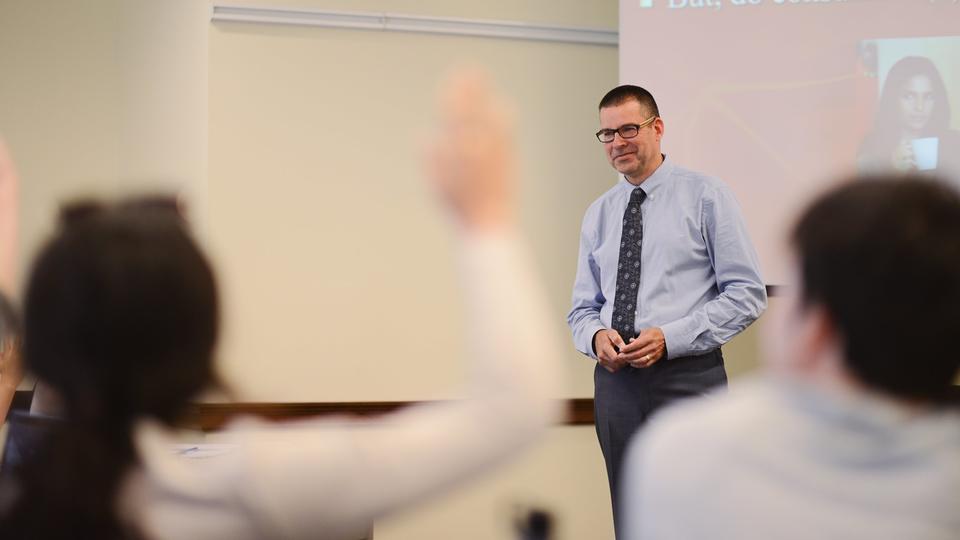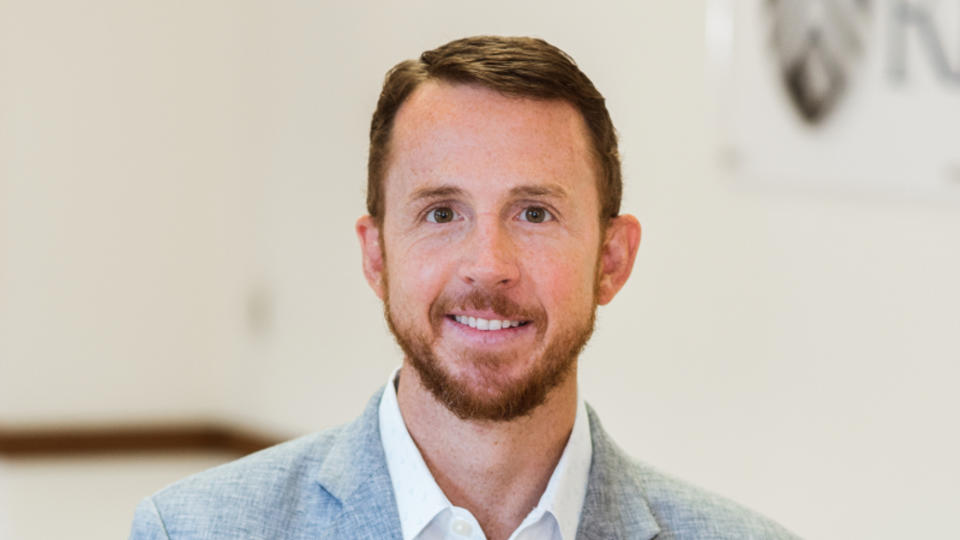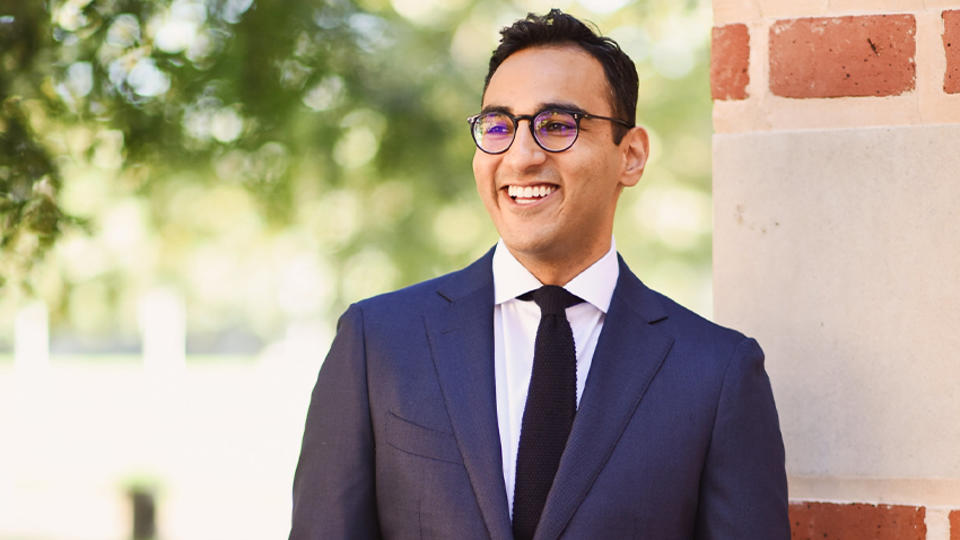Clearing The Air
How Activist Investors Can Reduce Pollution


Based on research by Kunal Sachdeva
How Activist Investors Can Reduce Pollution
In recent years, activist investors have been voicing their wishes – and changing corporate governance – with growing vigor. Most research, however, tracks the way these investors shape these companies in order to increase shareholder wealth. In a groundbreaking new study, Rice Business professor Kunal Sachdeva has shown that activist investors can also change a company’s environmental choices – leading to lower toxic emissions, greenhouse gases, and pollution in the neighborhoods around specific facilities.
“The Real Effects of Environmental Activist Investing,” a working paper co-written by Sachdeva with professor Lakshmi Naaraayanan and doctoral student Varun Sharma of London Business School, recently won the Moskowitz Prize from Northwestern University’s Kellogg School of Management. The prize honors work that shows how shareholders can positively influence a company’s environmental impact. Here, Sachdeva explains his findings.
RBW: What drew you to this topic?
KS: People are increasingly interested in investments that align with social mandates. One of these mandates is addressing climate change and the environment. Traditionally, investors express this concern through divestment campaigns: selling or not investing in fossil fuel companies or utility companies that are large polluters. However, if you do that, you lose a seat at the table. You can’t use your voice within these firms because you are not an owner.
Our question was: Can investors use traditional tools such as activism to demand that firms improve practices such as environmental behaviors?
RBW: What was the answer?
KS: The answer was yes. We approached this by studying the New York City Pensions System, which instituted an activist campaign called the Boardroom Accountability Project (BAP). The project gave pensioners a long-term voice in the companies where they invest, and one of their key mandates was addressing companies’ effect on the environment. To get our answers, we looked at firms that the Project targeted over environmental issues. We specifically wanted to know how these firms responded, how local economies were affected and what the financial implications were for the firms involved.
RBW: What challenges did you encounter in this research?
KS: Our main challenge was accurately measuring and linking the change in a firm’s environmental performance to the activism campaign. For example, a firm may have already been in the process of improving its environmental practices. If this were the case, our study could overstate the impact of the activism. So we needed to find a setting that let us precisely measure the effects of investor activism.
Studying the Boardroom Accountability Project allowed us to compare facilities that had been targeted with facilities that had not been targeted. We then used data from the EPA to understand the exact changes that each company was enacting.
RBW: What outcomes did you see for the targeted companies?
KS: On average, the plants targeted by the BAP reduced toxic emissions by 13 percent. We also saw a significant drop in greenhouse gas emissions.
When we looked beyond the plant level to the neighborhoods around the facilities, we saw a marked improvement in air quality.
We also tested whether the targeted firms were shifting their pollution output to offsite plants. There was no evidence of this. Nor was there any drop in production. What we did see was a striking increase in company’s abatement efforts and capital spending related to these plant-level efforts.
Finally, we wanted to understand how this activism related to stock prices. We found a slight decline in financial performance, but we are cautious when interpreting these results. Our study looked at a window of about three years. It may take more time than that for companies to see all of the financial benefits of investing in pollution-fighting technologies.
RBW: What’s the takeaway for investors who prioritize company environmental policy?
KS: This research shows that it’s possible to change company environmental practices through investing. There has been research about hedge fund activists demanding that firms change operations, but the main goal in these cases has been to increase stockholder wealth. There’s been a dearth of research showing that we can also use activism to influence company environmental policies. Climate change is one of the biggest challenges in our lifetimes. We think this research shows one exciting tool for addressing it.
Kunal Sachdeva was an Assistant Professor of Finance with the Jesse H. Jones Graduate School of Business at Rice University.
Never Miss A Story
Keep Exploring
Foot In The Door
The Power of Close Friends In Your Job Search


Based on research by Minjae Kim
The Power of Close Friends In Your Job Search
- Professionals are more likely to refer a friend, rather than an acquaintance, for a job.
- A money bonus can prompt individuals to give job tips to an acquaintance.
- Even with the promise of a significant bonus, however, people are still more likely to refer friends rather than acquaintances for a job.
Job hunting can feel like prying open a succession of elaborately padlocked doors, and making it through all of them might seem to require a miracle. In reality, though, you could know someone who has the right keys – and is willing to use them for you.
As layoffs and furloughs continue to transform the workplace, commentators often discuss whether job hunters are better served by a team of close friends or a wider, less intimate army of acquaintances. This discussion is especially relevant when about 20% of high-income workers appear to get jobs via firm-driven referral practices.
For years, research pointed toward the less intimate army. Casual acquaintances or friends-of-friends, the types of relationships known as “weak ties,” seemed preferable because they offered a greater number of and more diverse job tips. Social media platforms, such as LinkedIn, Facebook and other networking sites, thrived on the notion that loosely connected groups were more effective networks than the concentrated energies of a few friends.
But Rice Business professor Minjae Kim and Massachusetts Institute of Technology professor Roberto M. Fernandez have taken a fresh look at the matter, questioning whether weak ties are really that useful. In a recent paper, they analyzed when and why socially connected people share job opportunities they know about.
To gather their data, the team surveyed 196 first-year MBA students, asking half of them (randomly assigned) their willingness to help close friends and the other half about acquaintances. Both close friends and acquaintances were described as qualified for the opportunities.
Past research assumed that regardless of the strength of the ties, people would be equally likely to relay job information, thus focusing on the reach of weaker, more numerous ties. But in Kim and Fernandez’s study, the participants, most of whom were former professionals, said they were more likely to help friends than people with distant, weaker connections.
This was true even when the students being surveyed were offered a hypothetical financial bonus. Offering money for referrals is a time-honored practice in many industries, and indeed, when a bonus was offered, participants in the study were more willing to give a job tip to an acquaintance.
But the study also revealed that money isn’t always enough to make people pass along job information, which other recent research confirms. For some people, Kim and Fernandez found, helping a good friend is more important than gaining professional or social benefit by helping a mere acquaintance.
In fact, even when an acquaintance was known to be qualified for a job, and even with referral bonuses as an incentive, when it came to passing on job tips, most participants surveyed favored close friends over people with whom they only had weak ties.
Praising the weak tie is still de rigueur in many employment think pieces. But, the team concluded, landing a job requires more than simply knowing people who know about possible job opportunities. In many cases, someone needs to make an effort for you. We all have a range of motivations, only some of them financial, for sharing information. Friendship, Kim and Fernandez discovered, is a surpassingly strong motivator for relaying job information.
Having an intricate network can be a highly effective way to learn what’s out there. But because individuals have such a strong bias toward friends, big networks should not be a job hunters’ lone strategy. Keeping your friends close, it turns out, offers professional benefits. The person with the key to your next job may be standing nearer than you think.
Minjae Kim is an assistant professor of management at Jones Graduate School of Business at Rice University.
To learn more, please see: Kim, M. & Fernandez, R. M. (2017). Strength matters: Tie strength as a causal driver of networks’ information benefits. Social Science Research, 65, 268– 81.
Never Miss A Story
You May Also Like
Keep Exploring
Texas sees increase in number of residents picking Affordable Care Act plans
Approximately 383,000 Texas residents chose health coverage on the marketplace from Nov. 1 to Nov. 21. "The combination of more carriers, little to no rate increases and the impact of job loss is what’s driving buying insurance,” said Ken Janda, adjunct professor of health policy management.

Essay: Serving salads while serving time — future of sustainable food found in Texas prisons
Prison farm improves food sustainability and reforms within the American correctional system. Doug Schuler, Associate Professor of Business and Public Policy, is quoted.

We shouldn’t be panic buying again in the Bay Area, but some are. Experts explain why
Panic buying has returned for its second round in the Bay Area, even though industry officials are assuring consumers the supply chain is fine. Utpal Dholakia, professor of marketing, makes the argument that it could even be viewed as rational consumer behavior.

3 Houston innovators to know this week
In today's Monday roundup of Houston innovators, I'm introducing you to three innovators across industries — from sports tech to startup mentorship.

Excellent Job Prospects
No matter the state of the economy, there will be a need for accountants. If you become fluent in the language of accounting, you will have job opportunities that others simply don’t. And regardless of advances in technology, you can rest assured that accounting will always be needed, so the demand for accountants isn’t going away.


No matter the state of the economy, there will be a need for accountants.
Take a moment to consider it: every business relies on accounting information. There are no exceptions! Accounting is absolutely required for businesses to evaluate their performance, make informed decisions, and plan for the future.
Because financial reporting is essential for organizations of every stripe, accountants – from the entry level to the senior executive level – are always in demand.
If you become fluent in the language of accounting, you will have job opportunities that others simply don’t. And regardless of advances in technology, you can rest assured that accounting will always be needed, so the demand for accountants isn’t going away.
Great Immediate Job Prospects
Regardless of your undergraduate major or background, the Rice Master of Accounting (MAcc) degree can transform your career trajectory. Your immediate job opportunities are varied and plentiful.
Over the past four years, our Rice MAcc job placement rate by 3 months after graduation has been 100%. In fact, even in these current uncertain economic times, nearly all the students in our current Rice MAcc cohort have already accepted full-time jobs for after their graduation. And these students’ graduation date isn’t until May 2021! This means they’ve finalized their post-MAcc job just three months into the program.
Most Rice MAcc grads choose to take their first job with a public accounting firm, including Deloitte, EY, KPMG, and PwC. Others opt for jobs in corporate accounting, consulting, banking and not-for-profits.
Interested in Rice Business?
Ever-Expanding Long-Term Job Opportunities
As a Rice MAcc graduate, your job prospects continue to grow. The longer that you work in most professions, the more specialized your skill set and the narrower your job opportunities become. But the opposite is true in accounting, where your work experience actually makes you more versatile and in demand across different industries and sectors. This flexibility allows for professional satisfaction and job security as you move through your lifelong career.
- CEO
- CFO
- Audit Partner
- Executive Vice President
- Controller
- Head of Strategy and Planning
- Managing Director
The above list is a sample of the job titles of our experienced Rice MAcc alum. While their titles are diverse, what they have in common is their high level of seniority.
Does an accounting-based career sound like it’s for you? Contact us at ricemacc@rice.edu! We would love to share more information with you about the benefits of pursuing a graduate accounting degree at Rice.
Keep Exploring
Rice Business Professor’s Research Wins 2020 Moskowitz Prize
Rice Business Professor, Kunal Sachdeva is among three researchers who have won the 2020 Moskowitz Prize awarded by Northwestern University’s Kellogg School of Management for their work showing how shareholders can positively influence a company’s environmental impact.


A Rice University professor is among three researchers who have won the 2020 Moskowitz Prize awarded by Northwestern University’s Kellogg School of Management for their work showing how shareholders can positively influence a company’s environmental impact.
The winning paper, “The Real Effects of Environmental Activist Investing,” was written by Kunal Sachdeva, an assistant professor of finance at Rice’s Jones School of Business, and his co-authors from the London Business School, assistant professor Lakshmi Naaraayanan and doctoral student Varun Sharma.
The Moskowitz Prize is awarded each year “to the paper best representing outstanding research on sustainable and responsible investing and the financial implications of responsible business practices in capital markets,” according to the prize’s website. It is named in honor of the late Milton Moskowitz, one of the field’s most innovative investigators.
“We are honored to receive the Moskowitz Prize,” Sachdeva said. “Mr. Milton was a pioneer who fervently pushed for corporate social responsibility in his lifetime. Research on sustainable finance is of the utmost urgency and importance worldwide. We hope this research contributes to our understanding of how investors can influence change”
The authors said their research fills a fundamental gap in understanding the real effects of climate-focused environmental activism — especially the willingness and ability of shareholders to influence corporate environmental behavior and the impact it has on local communities.
The paper analyzed the Boardroom Accountability Project (BAP), an activist campaign initiated by the New York City Comptroller’s Office and supported by three of the four largest pension funds in the U.S., with over $650 billion in assets under management.
The BAP was designed to hold the boards of portfolio companies accountable to their long-term shareholders on a number of issues, including climate change. Sachdeva and the research team assessed the campaign’s success based on changes in corporate environmental behavior.
After analyzing 62 firms designated by the BAP, the authors found the companies’ plants reduced their toxic chemical release by an average of 13%, while also reducing their greenhouse gas emissions and cancer-causing pollution. The authors argue that firms reduce pollution more effectively through abatement initiatives rather than changes to production.
The authors say their research shows one catalyst for a successful climate-focused campaign may be a lead activist and a coordinated effort. Putting pressure on management through proxy access, through which long-term shareholders can nominate directors, provides the ability to monitor and discipline investors.
You May Also Like

Rice University’s Jesse H. Jones Graduate School of Business today announced the launch of its Graduate Certificate in Healthcare Management program, a 10-month, credit-bearing professional credential designed for current and aspiring leaders seeking deep expertise in the business of healthcare.
The Leading B-Schools With The Most Women
We're proud to have the second highest gains in women MBAs over the last five years in the full-time program, according to Poets and Quants and Forté Foundation.

Rice’s graduate entrepreneurship program again ranked No. 1 in US
It's official, Rice University and its Jones Graduate School of Business have gone back to back as the No. 1 graduate entrepreneurship program in the country, according to the 2021 rankings announced today by the Princeton Review and Entrepreneur magazine.


Rice University and its Jones Graduate School of Business have the No. 1 graduate entrepreneurship program in the U.S., according to the 2021 rankings announced today by the Princeton Review and Entrepreneur magazine. This marks the second consecutive year the Rice program has topped this category, its fifth time in a top 3 position nationally and the 12th year in a row ranked in the top 10.
The Princeton Review tallied its 2021 rankings based on a survey of leaders at more than 300 schools offering entrepreneurship studies. The 60-question survey covered the schools’ commitment to entrepreneurship studies inside and outside the classroom. Topics included the percentage of students taking entrepreneurship courses, the number and reach of mentorship programs, the number of startups founded by recent alumni and the cash prizes offered at school-sponsored business plan competitions.
In all, more than 40 data points were analyzed to develop the rankings, which will be published in the December issue of Entrepreneur.
Rice’s current offerings are university-wide and encompass renowned student- and community-facing efforts, from the Rice Alliance for Technology and Entrepreneurship, which launched in 2000, to OwlSpark Accelerator in 2012 and the Liu Idea Lab for Innovation and Entrepreneurship (Lilie) in 2015.
“Entrepreneurship and the creation of new businesses and industries are critical to Houston and Texas’ future prosperity and quality of life,” Rice Business Dean Peter Rodriguez said. “Earning the top spot again this year and our decades-long leadership in entrepreneurship education, anchored by Lilie Lab, and outreach, anchored by the Rice Alliance, is a testament to our visionary and world-class faculty, the enormous success of the Rice Business Plan Competition and of our commitment to our students and the community we serve.”
Skills to succeed in a new world
Lilie equips students, faculty and alumni with entrepreneurial skills and the entrepreneurial mindset through experiential courses, co-curricular opportunities and resources for founders such as coworking space, mentorship and equity-free funding. Lilie’s mission is to bring Rice innovations and startups to the world.
Lilie is a cross-disciplinary initiative, expanding the entrepreneurial resources at the business school and beyond to the entire Rice campus. Lilie has built its programming off the groundwork laid by Rice Business, which established one of the first graduate programs to offer entrepreneurial studies. Founded in 1978 under the direction of the late economist Edward E. Williams and expanded with the help of entrepreneurship professor Al Napier, Lilie’s faculty – 89% of whom are entrepreneurs – deliver 30-plus entrepreneurship courses and an entrepreneurship minor.
Lilie’s year culminates with the university’s new venture competition, the H. Albert Napier Rice Launch Challenge, in which Rice-founded teams compete for $65,000 in equity-free prizes.
Lilie is led by Yael Hochberg, the Ralph S. O’Connor Professor in Entrepreneurship and Professor of Finance at Rice Business. Hochberg is among the leading experts on accelerator programs and entrepreneurial ecosystems and serves as managing director of the annual Seed Accelerator Rankings Project.
Powering Houston’s success
The Rice Alliance, led by managing director Brad Burke, brings startups and investors from around the world to Houston and Rice. The Rice Alliance’s activities serve the Houston entrepreneurial and investment community with nationally recognized events brought to the city. More than 2,500 startups that have been showcased at the alliance’s events have gone on to raise more than $8 billion in funding.
Over 52,000 investors and corporate and industry leaders have participated in Rice Alliance in Technology Venture Forums in energy and clean tech, digital technology and life sciences and other programs. In September, with support of the major energy corporations, the Rice Alliance announced the launch of the new Rice Clean Energy Accelerator to support the energy transition to more sustainable energy sources.
The alliance’s flagship event is the annual Rice Business Plan Competition, which is the world’s richest and largest student startup competition. Startups from across the globe – including one team from Rice – compete in front of over 300 investor and industry judges. The competition awarded more than $1.3 million in prizes in 2020.
“Entrepreneurship and the creation of new businesses and industries are critical to Houston and Texas’ future prosperity and quality of life, Rodriguez said.
Rice is currently working with Houston and major corporations and organizations, such as the Texas Medical Center and NASA, to define and develop the future of technology and industry innovation in the city, and is developing the Midtown innovation district anchored by The Ion, which is scheduled to open in spring 2021.
To view the complete rankings, visit https://www.princetonreview.com/business-school-rankings?rankings=top-25-entrepreneurship-grad.
You May Also Like

Rice University’s Jesse H. Jones Graduate School of Business today announced the launch of its Graduate Certificate in Healthcare Management program, a 10-month, credit-bearing professional credential designed for current and aspiring leaders seeking deep expertise in the business of healthcare.











